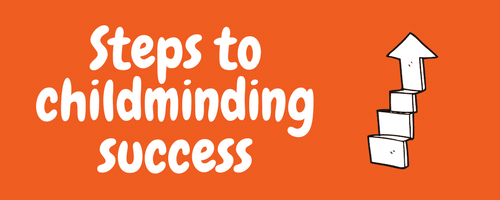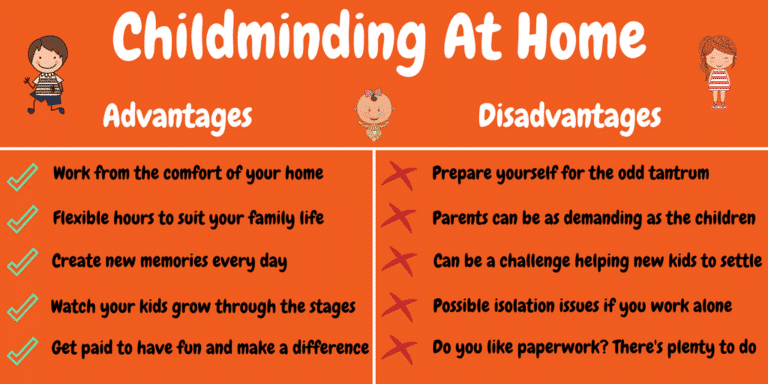A career in childminding makes it easy to support your child without sacrificing a thing
Are you an ambitious individual? I bet that when you’re at work, you’re in your element. The challenge of a regular 9-5 day keeps you fulfilled and eager to progress – that’s until the B-Bomb drops, aka Baby Bomb. Your heart melts, and grows so attached that heading to the office each morning becomes a drag. Now you’re starting to regret the childminding centre you left your kids at because you know you can do a better job, but also because you’re missing the moments no parent should miss: the walking, talking, and the awe of self-discovery. Suddenly, your career isn’t as fulfilling anymore, but you realise your partner can’t support a family on one wage. Now you’re stuck wondering what to do.
If this sounds like an inescapable situation or that you feel doomed to serve in an office as your child, like many others, grows up in the arms of someone else, think again. There are a plethora of options to support your family from home and enrich their lives. If you have a love for kids, especially your own, one no-brainer option is childminding – at least until your child’s old enough for you to go back to work.
48% of workers felt that working hours negatively impacted quality family time
The work-life balance: Does such a career exist?
It’s always a hot topic in the news: the work-life balance, but does a balance exist or is it a contemporary buzzword flying around the workspace. You’ll often hear stories about how parents have rejected promotions, stalled their careers or taken leave to care for their children. It seems that on the surface, there are not enough hours in a day to successfully balance a family with a career, which often leads to strained family relationships. Quite the pickle for workers, it seems.
In 2017,
The Modern Families Index reported that 48% of workers felt that working hours negatively impacted quality family time, with only a third of parents saying they leave work on time. And then there are the news stories that spout nonsense about how stay-at-home parents are making bad career moves.
With all this negativity overflowing, it’s easy to put up, shut up and leave your children in daycare; after all, statistics don’t lie, but that doesn’t mean you must follow them blindly. What’s to say stay-at-home parents can’t have the best of both worlds: flexible hours, more time with the kids, and a career to pursue. This leads us to question: Are stay-at-home parents making a big mistake?
Hardly, there are several household winners, from authors to bookkeepers and
childminders. One cool success story is a champion of the social media platform, Instagram. With over 754 thousand followers, Simon, aka Father of Daughters, is making an impact, but more importantly, getting to spend a hell of a lot more time with his four special daughters. We’re a big fan of this video post because it’s funny but true; maybe it’ll inspire you, too. As a parent, this is something you’ll know all too well:
If that post resonates with you, why not check out Simon’s page:
https://www.instagram.com/father_of_daughters for more fun stories, pics and childminding tips?
Okay, so we’re not saying everyone’s going to be the next social media mogul, but we are saying it’s possible to run your own
business from home and be successful. And with childminding, you get the best of both worlds – a career and your children in one package. You’re also given flexibility in terms of which hours and days to work. Best of all, there’s no shortage of busy parents with children.
So, what’s childminding all about? Don’t worry, below we’ll give you a quick rundown of why getting the skills, and the
qualifications and starting up your home business could be the best decision you could ever make during those crucial years when your child is growing.
Starting a childminding business

Step 1: What is childminding and what do childminders do? 
You might be thinking, ‘Wait a minute, I’m a parent and know how to look after children just fine!’
Yes, we’ve no doubt you’re an excellent parent. However, childminders are registered professionals who you pay to look after your children while you’re at work or away on business. They’ll offer parents practical, everyday solutions by providing stable home-from-home childcare and early educational service that supports the primary learning and development of young children by enriching their lives.
Children are sponges during those initial years – a time when they are in constant need of attention and stimulation to cure their wonder. This stimulation is gained through daily interaction and play where they will develop a range of core life skills, from language to emotions to social, intellectual and physical skills. Most childminders are trained to ensure children develop their foundations in an exciting way. This is important as those early stages significantly impact a child’s well-being and growth into adulthood.
Step 2: How many children a childminder can care for? 
Don’t worry you don’t need to hire a minibus for that trip to the park.
Ofsted regulation will only let childminders care for up to six children under the age of eight at any one time. Of these six children, only three can be under the age of five, and only one of those three can be under 12 months old; this includes a childminder’s own children. However, hiring an assistant gives you the luxury of handling up to 12 children. Of course, failure to abide by these rules can land you in deep water.
Step 3: What are the advantages and disadvantages of childminding 
No job is perfect otherwise everyone would be childminders, and you would never get any business. However, like other roles on the market, childminding has both pros and cons. Check out our little infographic below for a list of some of the most important ones.

Step 4: How do I register as a childminder? 
Before opening your house for business and whizzing around the neighbourhood posting leaflets through doors advertising your services, you’ll need to register with the correct authority. In England, that authority is Ofsted, and applying is as easy as following these steps. They’ll take you through the following:
1. Contacting your local council to find out what you need to do
2. Applying for a Disclosure and Barring Service (DBS) check
3. Submitting a health declaration booklet if applying on the early years register
4. Applying online.
Remember, registration is incredibly important if you want to avoid charges or a prison sentence. After all, you’re working with children, so the authorities need to know you’re safe and sane of mind.
If you’re registering as a childminder in
Scotland,
Wales and
Northern Ireland, different rules apply, but you’ll likely have to follow similar steps. Click on the links for the relevant web pages.
Step 5: Are other child-minding requirements needed before setting up shop? 
Setting up a business is exciting stuff, but it’s no child’s play. You need to ensure you cover yourself from every angle. And what we mean by cover yourself is having tight references and getting the relevant training, such as
First Aid certification and an
Early Years Foundation Stage document (EYFS). Yes, that means participating in a few training courses, but that’s all part of the fun – it gives you fresh skills yet also makes you look super professional, so when a parent considers you as their childminder, you can show them all your lovely certificates. They’ll be psyched to leave their child with you.
Yes, we know, EYFS sounds scary, but it’s simply a standard legal document outlining your obligations as a childminder in relation to children’s health, learning, care and development from birth to five. It’s something all Ofsted-registered early years carers need to follow. Besides, it’s best to know your boundaries.
Other things you’ll want to consider:
1.
Public Liability Insurance Cover your business should anyone get injured.
2.
Car Insurance If you’re intending to take the kiddies out anywhere in the car, this is needed.
3.
Registering with HMRC – Registering your business is as important as paying your taxes.
Step 6: What qualifications do you need for a career in childminding? 
Sure, there are childminders out there with no formal qualifications, but we’re pretty sure you wouldn’t trust your children with them. After all, the relevant qualifications tell someone you have the ability to teach their child but also the skills and preparation to face the challenges of the job. Also, technically speaking, if you’ve taken the time to glide through the steps above, leaping that final hurdle like a Grand National horse to get yourself that certificate tells parents that you’re awesome.
At
Oxbridge, we understand how early education is one of the most important factors in determining a child’s future. If you’re aiming for a life-changing career in childcare and education, then why not check out one of our recognised online
childcare courses? They’re designed to give you kickstart your career, with lots of insight into how to care for children in any setting, including our Ofsted-recognised
NCFE CACHE Level 3 Diploma for the Early Years Workforce (Early Years Educator), which will teach you everything you need to succeed at childminding.
You’ll start as a beginner but finish as a champion, with several career options! Our
expert tutors provide personal tutor support, and our
distance learning courses give you the flexibility to work around your current lifestyle. This means you can study while working in the office or at home with a glass of red to gain the skills before handing in your notice. For further advice about our childcare courses or perhaps a chat about your future, give our advisors a call today on
0121 630 3000 for assistance.





